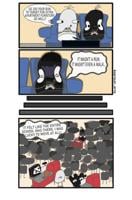North Carolina Republicans are claiming that some teachers are abusing their position to “indoctrinate” students with leftist views. On Aug. 24, the state’s Lt. Gov. Mark Robinson released the “Indoctrination in North Carolina Public Education Report,” which raised concerns about the way certain material is being taught in classrooms across the state. This report comes as Republican state legislators are pushing to pass new legislation on how topics such as racism are discussed in schools. Several other states have taken similar steps in regards to the highly debated topic of Critical Race Theory being taught in public schools. So what are we to make of our state legislators’ actions?
First, let’s dive into this notion of indoctrination. It has turned into quite the buzz word in our current political environment. However, I think it sounds a bit harsh. Republican lawmakers have made it sound as if kids are being brainwashed, or made to believe that leftist ideology is just the bees knees. This simply isn’t true, and quite frankly it’s reckless to suggest. It’s critical that they drop this “indoctrination” line and find a better word that fits the issue. Although, I agree this is a topic that should warrant some public attention.
The report that Robinson presented included around 500 complaints from concerned parents who believed their children’s teachers had been unprofessional when discussing controversial issues. This included reading books that discussed identity politics, debates on white privilege, and critiques on Christianity. Now if we set aside our own political biases I think we can try and understand where these concerns are coming from. If you’re a parent who has raised your child on certain principles and beliefs, you would probably feel threatened when discovering that someone is teaching them a different set of values. Let’s not forget that the students themselves might also feel threatened by new ideas which they feel are being forced upon them.
Most of us have probably taken a course sometime in our lives, either here at NC State or in our former high school days, where the teacher was more than happy to give their opinion on hot button issues. Whether they’re demonstrating left or right leaning tendencies, teachers should be more mindful when discussing debatable topics in a classroom setting. When teachers voice their positions they may unintentionally create an environment in which students feel like their own differing opinion might affect their performance in the class.
Think about it this way: have you ever had to write an essay about a political topic? Now at any point when you were writing that essay, did you ever feel like you needed to change your own position because you believed it’s what the teacher wanted to hear? I’ve experienced this exact scenario several times and I am sure many of you have as well.
I, for one, don’t believe that any type of legislation is required at this point in time to curtail public school educators from giving their opinions in the classroom. However, teachers need to be more reserved and professional when discussing current events with their students.
No student should ever have to feel as if their own opinion is valued less than others in a classroom. This doesn’t mean teachers should be barred from expressing their own views when their students ask for them, but students should always be the ones driving debates. That being said, North Carolina Republicans would be better off if they dropped this “indoctrination” claim and focus their efforts on more important issues that are currently afflicting this state.




(0) comments
Welcome to the discussion.
Log In
Keep it Clean. Please avoid obscene, vulgar, lewd, racist or sexually-oriented language.
PLEASE TURN OFF YOUR CAPS LOCK.
Don't Threaten. Threats of harming another person will not be tolerated.
Be Truthful. Don't knowingly lie about anyone or anything.
Be Nice. No racism, sexism or any sort of -ism that is degrading to another person.
Be Proactive. Use the 'Report' link on each comment to let us know of abusive posts.
Share with Us. We'd love to hear eyewitness accounts, the history behind an article.